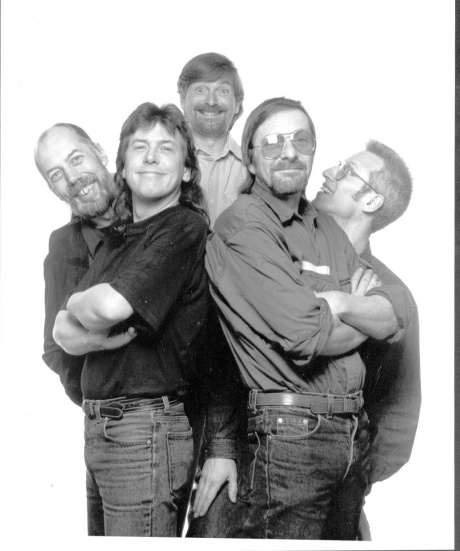It is an organic, living breathing thing. It all goes round in circles.
This was the nearest Lindisfarne drummer and manager Ray Laidlaw ever got to what he described as “arty-farty” as he perched on the edge of his stall in a bar in his home town of Newcastle. He was describing Lindisfarne’s music and was probably quite accurately outlining what the band had been doing for the past twenty years, illustrating graphically from time to time with some wild swipes from his coffee spoon. The band have managed to turn out a quite staggering array of material with zest quite equal to his gesticulations. They have managed to stir themselves a mixture which has evaded categorisation. They have simply never stayed still long enough to be nailed down.
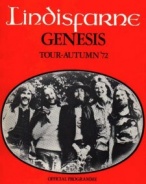 Lindisfarne have mixed it with everyone and on many occasions acted like a good dose of salts, a band of extraordinary medicinal qualities. They have been supported by groups who have gone to be international stars, including Chris Rea and Genesis. They have also supported those who had already made it. There has been little in the way of conscious planning or self-analysis - they have just gone ahead and played the music they felt was right at the time and discovered themselves in the process.
Lindisfarne have mixed it with everyone and on many occasions acted like a good dose of salts, a band of extraordinary medicinal qualities. They have been supported by groups who have gone to be international stars, including Chris Rea and Genesis. They have also supported those who had already made it. There has been little in the way of conscious planning or self-analysis - they have just gone ahead and played the music they felt was right at the time and discovered themselves in the process.
In that sense they are an enigma of simplicity, having found what other bands spend so long looking for, or pretending to, without the “artistic” angst. They have come from a northern environment where pretensions to artistic sensibility are swiftly purged leaving the raw stuff of human experience below to feed the music.
Lindisfarne are appropriately named after the ancient monastic settlement of Holy Island which sits isolated off the Northumbrian coast. Somehow the group seems to have a unique simplicity that has separated them from the mainstream of rock even though they have spent the last twenty years being buffeted by the tides and storms of musical fashions. The band still has the same line-up it started with in 1969 and their latest album Amigos is a simple celebration of their friendship.
“We are going back to the old sound with Amigos. It speaks for itself. It is an approach. None of us are marvellous musicians. It is all about chemistry. The whole reason we got into music is because it’s fun. For us it’s like marriage. You need to able to live with each other. What we do together we do better than we would with anyone else.”
Somehow by saying and playing the most simple things with conviction Lindisfarne touch ordinary working experiences that their audience have all lived through. On stage at Newcastle City Hall that night Ray Jackson, known as Jacka to the band, performed on solo mouth organ, an impression of a Bonny 750 motorbike to the delight of his audience. It was so vivid you could almost see the pool of oil collecting under his feet.
Guitarists Rod Clements and Simon Cowe met on their first day at primary school but never came to blows with each other. Ray got to know Si because they lived just round the corner from each other and Rod met Ray in a chip shop and found he was extremely good at bashing the skins: Later on in life when Lindisfarne first appeared on Top Of The Pops, Ray rather appropriately thrashed his drums with a rubber fish. Song writer and general musician Alan Hull and Jacka the hot harmonica player were brought up in Benwell and Wallsend respectively. They had all met up before their teens were out in equally close and fishy circumstances.
There was something disconcertingly ordinary about the whole set up and that is probably why the band have kept body and mind in the same neighbourhood for so long. Ray sat sipping delicately at his coffee as we hacks slurped away at our pints. This is a band that has been through the whole rock and roll swindle and come out of the other side, reasonably healthy (despite Alan playing with a broken ankle on stage), reasonably wealthy and still very much in one piece, and they want to keep it that way. Other things haven’t survived quite so well in good old rock and roll style: ”We’ve had a few divorces in the band over the years. It is an occupational hazard.”
Ray was full of confidence for the future with the band playing another of their annual Christmas shows that evening at the Newcastle City Hall. This is a time something uncanny about the event. (sic) It is a celebration of northern working independence, a communal release of regional and seasonal affection.
A band who have had their share of drugs and drink, these Wild Men From The North East, have more than three generations of ordinary working Geordies mesmerised every year. Grannies are up and dancing, waving banners and chanting the words of classics like Run for Home and Meet Me On The Corner. Fathers who saw the band in the seventies hold their children above their heads to absorb the communal understanding. The Byker Wall spirit rolls through the hall. This is the closest you can get to a pop / rock version of last night at the Proms. Newcastle is the land of hope and glory. This is a royal variety performance.
“It is always special playing in your home town. I’d like to think we do a good show. People up here are very open. There is no airy-fairy stuff here. They love seeing something done well. We started playing to our contemporaries and part of that audience are still the same people. It is a show. We always call them shows. We’re entertainers, that’s what it comes down to.”
Lindisfarne have become an institution. They have helped Northumbrian police run campaigns, have written a song in support of the Scottish and Newcastle brewery when it was threatened with an Australian takeover bid, and have become regular faces on the Tyne Tees and BBC North East. The band still live and work up north and refuse to become another fossilised rock monster relying on their past success.
The old bands don’t stop because they have reached a certain age. As long as we can keep on coming up with new stuff. The new album is much more cohesive. I have got a feeling in my bones that our day is coming again because people are starting to take our stuff more seriously. There will always be songs there. Alan (Hull) cannot stop writing songs. We can’t get Melody Maker to review our new single because we have committed the cardinal sin of being over thirty and still playing. The gig format is geared around new material but the audience still demand old stuff. The main cause of fear is not knowing where you are going. Having this annual do is in some ways a bit of a drag. People expect you do it. To be truthful we are scared to stop.
Being the antithesis of fashion is something that the band always seems to have thrived upon. These ragged Northerners rose to stardom at the height of glam rock and continue to punch out three minute masterpieces when the taste for concepts had extended to triple tales of topographical oceans. Lindisfarne have always found it hard to be anything other than themselves and they are content with the hard North Sea, increasingly polluted and dying though it is.
“The trouble with images is that you get stuck with them. We have ignored fashion really. A couple of albums is us doing what we do best.”
In a typical Lindisfarne conflict Ray espoused a flexibility and openness. ”We used to see ourselves as successors to the Beatles.”
They didn’t have a particular style. If the critics really like you they say you’re versatile. If they don’t they say you lack direction. Lindisfarne believe versatility and a sense of direction are complementary. The band members are all Geordies born and bred and buttered and blessed by the mouth on the Tyne. Newcastle has an amazing levelling effect and social differences cut little ice in a city where individual worth is ingrained into the communal psyche.
Newcastle hasn’t changed much. Don’t let the cosmetics fool you. There are still housing estates where there is terrible poverty and unemployment. The Geordies’ personality has been forged in adversity, much like the band’s. There is an indomitable spirit which is reflected when every Friday night thousands of young people pour out into the centre of the city to enjoy themselves, despite unemployment and a lack of readies. There are 60,000 people in 500 square yards of the city and only three coppers.
At the Lindisfarne gig that night there was not a sign of a policeman despite the fact that there were several chapters of bikers from all over the country at the city hall. The good humour fostered at the Lindisfarne Christmas bash seems to draw out something essentially binding between the most incompatible groups of people, swilled around in a straight glass, pronounced hard like it should be.
It is significant that their most successful album Fog On The Tyne outsold every other album in Britain except Bridge Over Troubled Waters in 1972. There is something all pervading about the band. They seep into you like a mist. Their music is insubstantial but essential. Perhaps that is what Ray meant when he talked of the organic nature of the band’s music. Although Ray does not believe the music can change anything, he admitted, “There was a strong socialist element running through the music from day one.”
Ray’s father worked in the Swan Hunter shipyards and he was brought up in Tynemouth. He went to St Cuthbert’s Grammar School where a few years below Ray another lad was showing a bit of promise on the football field. He was later to become Sting. Neil Tennant of the Pet Shop Boys was also at the school.
“I have still got a photo of him in a Gilbert And Sullivan show with a frock on.”
Simon and Rod were both from pleasant middle class families and both went to a private school but they all drink the same water in Newcastle and they never lost touch with their raucous and un-genteel primary school experience and stumbled across each other a few years later.
In 1964 Si and Ray decided to get a band together and came up with the name the Aristokats. Several name changes and line ups later Si, Ray and Rod eventually got together. The cafes and dives of Newcastle exerted a magnetism on the young lads as they crisscrossed the city in their everyday lives. Bands grew and disintegrated and flowed with tide and Tyne. Rod and Ray used to go to Whitley Bay to see their idols the Junco Partners, successors to the Animals, playing a dark sticky black beat all night.
“We advertised for a guitarist and Jeff Sadler turned up. He had about four guitars and a van so he got the job straight away. Luckily as it turned out, he was extremely good. Jeff had been to school with a young lad who was to go on to do a bit of guitar tuning with a group called Dire Straits. His name was Mark Knopfler. Downtown Faction was born, “We thought that name was really hip and black.”
Their desire to make a living out of music was strengthened by the lack of work at home.
“When we were kids there were only two or three jobs you could do. You could work in the shipyards, go down the coal mines, go to sea, or if you were really good you could be a footballer. I met Ray Jackson at college. He played this amazing harmonica. At that time loads of people were coming in and out of the band. Ray was a naturally gifted character. We saw him with his band Autumn States. He could talk to 12,000 just like they were in his front room.
Si came back from school. He had been to Fette’s School In Edinburgh where the film If was set. Here Ray paused and smirked, “Ray Jackson’s wife was the first woman ever to slash in that building.”
A mighty blow against the bourgeoisie!
The raw stuff matured through their experiences of playing working men’s clubs and social clubs. They learned to be flexible and realistic and to get drunk.
“I had grown up with R & B bands but when you were trying to earn a living you end up doing anything you can get. In the social clubs all they wanted to hear was chart stuff. It taught us how to handle people. If they didn’t like you they paid you off on stage. That only happened to us twice.”
In 1968 a lot was happening on the music scene and the times were a changing as were the substances. The lads got to know a more mature musician who had been knocking around a few years longer than they had.
“Alan was a couple of years older than us. He had been in the Chosen Few. They had their own programme on Radio Luxembourg. That made them immensely famous. Alan started running this folk club in Whitley Bay and we started hanging around there.”
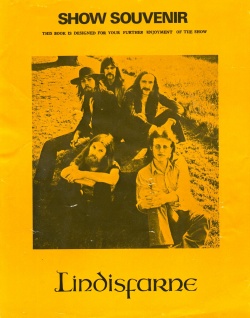 They experienced a new wave of music hearing artists like Al Stewart, Jerry Rafferty and Billy Connolly in the Humble Bums, and the JSD Band. The various musical boundaries were being breached in the sixties and they were being exposed to an increasingly fertile inter-pollination of musical styles.
They experienced a new wave of music hearing artists like Al Stewart, Jerry Rafferty and Billy Connolly in the Humble Bums, and the JSD Band. The various musical boundaries were being breached in the sixties and they were being exposed to an increasingly fertile inter-pollination of musical styles.
“By then we were keen to do our own material in the folk clubs. There were so few places where you could do your own material. Rod had recently taken up the fiddle and I used to sit at the back and clap like mad. They gave us the opportunity to try out songs to see what would happen.”
At that time Rod was nipping backwards and forwards between the band and university where he was studying ancient history. Si used to work at a photographer’s, finally getting the push because of his hair. He found a more successful line in organising Newcastle’s first ever open air festivals which attracted upwards of 4,000 people. Ray took a more philosophical view about work:
“I was one of those realists. I never had any idea that we were going to be rich and famous. Well, I was half right. I had to get a job for my parents. I was a window dresser.”
As the band’s manager he is still doing the same job.
Ray Jackson followed sound working principals as well. He drove a lorry for the Co-op, and studied how to impersonate the internal combustion engine.
“Alan Hull worked in a mental institution. It changed his life. He used to sit and talk to them. It had a very big effect on his writing. Jeff Saddler was talented in many different directions. He was an artist, musician, mechanic. . . He was so good at so many things. He couldn’t make up his mind what to do. One day he did and he left the band. He still lives locally. He was almost in Dire Straits.”
In 1969 Alan Hull and the Brethren, as they were called, did their first gig together.
“We were having a party at the folk club and we decided to do half the set. The way we eventually recorded Lady Eleanor was exactly the way it happened in the club. Alan began the song and the band came on one by one and started to play. There was something in the air. . . I know it sounds a bit arty farty. I said ‘That’s it. We’ve cracked it’. And that was it from there on.”
From that night on the Brethren and Alan Hull played together increasingly often. Alan appeared at the few Brethren gigs that they could get together, and the promoters of Alan’s gigs were surprised to find their solo singer turning up with a full backing band. They billed themselves as Alan Hull with The Brethren or The Brethren with Alan Hull, depending on which audience they were playing to.
“People used to actually sit down and listen, we began to get good press.”
Island Records expressed an interest in the Brethren in 68/69 and the lads went down to London to put some music down on tape for Guy Stevens at a new studio called Morgan’s which is no more. They recorded now and again for a few months, travelling between Newcastle and the studio. When Stevens took his leave of the band they were allowed to stay at the studio and finish what they begun. It had the Creedence Clearwater feel and the band really felt they were getting somewhere.
“We only found out later they were using us to test the new studio.”
The album was never released but provided the band with good recording experience. In 1970 things seemed to be hotting up for the band as their managers agreed to work together on making an onslaught on the national music scene. A demo-tape secured them a gig at the Marquee in London and a independent record company called Charisma recognised something exciting in the music and the band. Tony Stratton-Smith offered the band a recording contract.
The band had also recorded at Abbey Road No.1 Studio.
“That was so intimidating. Air London, set up by George Martin and Chris Thomas, offered us a deal as well but Charisma was the new independent. It has such a great feel about it we threw our lot in with them.”
Life was a whirl from then on. The commuting between Newcastle and London became too much of a stand and they all moved down to be permanently at the heart of where it was at! They used to sleep on friends’ floors, moving every few days until they eventually came back to the first in the hope that the first friend’s memory had faded and they could start the circuit again.
“Charisma didn’t have a single band that was making money at the time and the whole thing was run on a shoe string.”
With the warmth of the summer festivals 1970 beckoning and their first album already well in the pipe line Charisma told the band they would have to change their name. A band had emerged in America called Brethren who looked like they were on the brink of making it big.
After several weeks of straining their rather depleted brain cells they still remained dry of ideas. Then one night when the band and John Anthony, producer on their first album, were having a meeting at Rod’s house in Tynemouth and the conversation somehow turned to Lindisfarne. It just seemed fitting and so Lindisfarne the band was born (no one ever heard of the American band again).
Charisma decided to run a Six Bob Tour. The package included three bands, Lindisfarne, Van Der Graaf Generator, and an unknown outfit called Genesis.
“We toured the country using the same gear, the same bus and everything.”
Ray remembered vividly how they would while away the hours before the gig. Genesis would relax with their picnic hampers and bottles of sherry, reading their novels. Van Der Graff Generator were huddled together building enormous joints and reading extracts from science fiction magazines to each other, and down to earth Lindisfarne would play cards over a couple of crates of Guinness, the nearest thing they could get to the brown stuff. A small bearded figure who went by the name of Phil Collins, and still does I’m told, jumped from group to group spending a quarter of an hour with each!
At the end of each concert the three bands would come on stage together and would play Lonnie Donegan’s Battle of New Orleans.
“We all had a verse each. It seemed like it went on forever at the time. We didn’t notice the pressures of touring so much in those days. We never stopped.”
They did the festival circuit, including the big ones like Reading and Knebworth.
“There was a lot heavy material then. Real Spinal Tap stuff but we just used to shamble on and do it.”
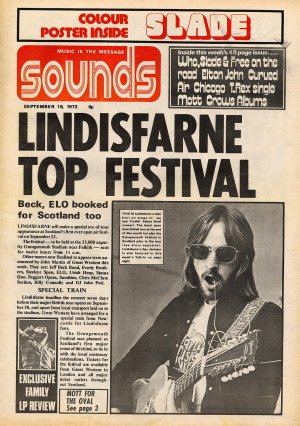 Lindisfarne had control over the elements. For six consecutive festivals rain lashed the stage but half an hour before Lindisfarne came on the sun burst through the clouds. Nature was being good to the band, everything was going their way. Once when they were playing an open air gig in Switzerland the gods created a dramatic stage show by throwing a lightning bolt at them. It crashed on the stage and luckily no one was hurt. A trick perhaps more fitting of Van Der Graff Generator but hair-raising nevertheless.
Lindisfarne had control over the elements. For six consecutive festivals rain lashed the stage but half an hour before Lindisfarne came on the sun burst through the clouds. Nature was being good to the band, everything was going their way. Once when they were playing an open air gig in Switzerland the gods created a dramatic stage show by throwing a lightning bolt at them. It crashed on the stage and luckily no one was hurt. A trick perhaps more fitting of Van Der Graff Generator but hair-raising nevertheless.
Life was traditionally rock and roll for the band in those early days.
“Four of us were single (Alan was married) and we were getting a wage from Charisma. We were paid £25 which in 1970 was a lot of money with nothing to spend it on except drinking and having a good time. We used to be out with the journalists every night. We were the darlings of the press for about a year.”
The first album Nicely Out Of Tune was recorded at the Trident Studios during those hectic times in 1970.
“It got great reviews but didn’t sell much. People were not ready for what we were doing.”
Their block busting second album Fog On The Tyne, which was to turn platinum, had a more difficult and bloody birth. Bob Johnson, who had worked with Bob Dylan and Simon and Garfunkel, expressed an interest in producing the album.
“We brought out all the songs we knew and polished them up. He got us in the studio and threw all the arrangements away and made us start again. When the album was finished it was all very stark but Bob was right. He distilled the essence of what we were about and took us back to basics. It started selling well and resulted in a lot of festival appearances.”
It is the essence that they have recaptured in their latest work. It carries the common touch, having no particular musical slot to grind into.
“We saw ourselves as the successors to the Beatles. They treated every song as it needed to be treated.”
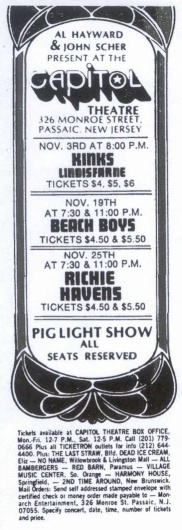 They went off on their first American tour just before Fog On The Tyne really made it big in 1972. It reached number one and stayed there for six weeks and was in the top twenty for over a year.
They went off on their first American tour just before Fog On The Tyne really made it big in 1972. It reached number one and stayed there for six weeks and was in the top twenty for over a year.
The first American tour was like a dream. They originally went to America for only a few weeks but new dates kept being added and when they eventually returned they were superstars. On that tour they proved their working adaptability and staying power, playing like bands as disparate as The Kinks, Zappa and the Mothers, The Beach Boys, It’s a Beautiful Day and Bowie on his mind blowing Ziggy Stardust tour. Life was weird and wonderful in the States. One night Ray Davies of The Kinks took the band to a night club in New York.
“I thought it was full of the most gorgeous women in New York but I suddenly realised they were all blokes. One of them was Dave Davies, Ray Davies’ brother and also in The Kinks, in a beautiful frock.”
One night in Texas they were taken to a bar by some girls and found that their hairy northern English presence was not appreciated by the locals. In a scene taken directly from the wild west they left just in time by the back door.
“We had to be removed because this guy came in looking for us with a shot gun. They didn’t like us messing with their girls.”
For weeks everything seemed unreal, going from town to town only catching glimpses of another culture through a haze of airports, tour buses and concert halls. Even coming back to England was weird.
“It was bizarre when we got back. We were huge stars and we didn’t feel any different. We got off the train at Newcastle to be met by massive crowds. You couldn’t even walk up the street. I’m pleased it didn’t last any longer than six weeks, I couldn’t stand all that. The success was great but we knew it wouldn’t last. We were caught in the middle of all the glamour stuff. It was special because we used to take the piss out of other bands who were a bit pretentious. We used to rely on the fact that we looked like wild men from the north and we liked people being scared of us, but we were harmless really.”
The band had begun to roll a bit too fast and the going was getting heavy. The life style and the touring was beginning to put a strain on Alan who wanted to spend more time with his wife and three young children in Newcastle. While he was sleeping on floors he found it impossible to come up with new ideas for songs. Even then he didn’t have any money because he was sending it all back home to his family.
Realism was always and always will be the rock upon which the church of Lindisfarne is built and it is this earthly understanding that distinguished them from the glam-rock around them. Perhaps the band lost a sense of proportion severed from the northern roots that fed them.
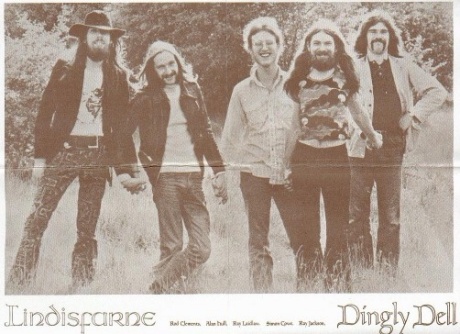
With the third album Dingley Dell, they were sure it was going to be even bigger than Fog On The Tyne, but it wasn’t.
“It went to number 4 or 5 in the charts and dropped fairly quickly after that. We all thought, Christ, this is a real failure. We started asking questions, but we decided on different solutions to the problem so we sat down in a pub one night in Barnet and agreed to differ. We broke up but we had started out as mates and we wanted to stay that way.”
The band had been touring taking Genesis with them as support paying them £100 per day. At the end of 1973 the band went on their last wild tour of Australia with Status Quo and Slade and finished off in Japan.
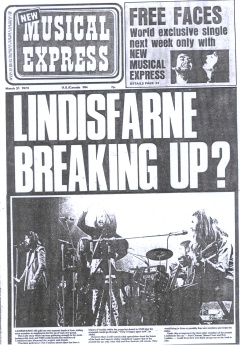 Following the break up their record company was tearing their hair out but Lindisfarne stayed true to themselves splitting up to do their own things for a while. Ray admitted that perhaps they should have had a little more business acumen at the time. They could have demanded both time to rest plus a lump sum, but it just didn’t happen that way.
Following the break up their record company was tearing their hair out but Lindisfarne stayed true to themselves splitting up to do their own things for a while. Ray admitted that perhaps they should have had a little more business acumen at the time. They could have demanded both time to rest plus a lump sum, but it just didn’t happen that way.
During the three “wilderness years” as Ray called them, they each followed their own projects. Rod, Si and Ray started a band called Jack The Lad and produced four albums under that name, none of which sold very well.
“Lindisfarne was a very hard act to follow. The feel was wrong in Jack the Lad.”
Very little could keep the friends apart and away from the pubs and they met and collaborated in various combinations right through the wilderness years. Ray was playing on Alan’s first solo album only three weeks after Lindisfarne had split. Alan and Ray J (known to his mates as Jacka), formed Lindisfarne II and recorded two albums. Jacka followed with some solo albums. Rod did session work with Bert Jansch, Ralph McTell and Michael Chapman. Simon joined the 7/84 Theatre Company in London (named after the fact that seven per cent of the population own eighty-four per cent of the nation’s wealth).
These days of experimentation and lassitude were exactly what the band needed to get back in touch with themselves. One dark December night in 1976 they all got together in a bar in Tyneside for a drink. It was the first time they had all been together since the split. They agreed to do a one off Christmas reunion concert at Newcastle City Hall. They only had three days to get it together. Somehow the rest was inevitable.
The very first Christmas show had been some years before and the ‘76 bash was merely picking up where they left off in 1970.
“In 1970 we asked our manager to make our last gig in Newcastle so that we could go home for Christmas. All of our friends wanted to come so we shoved them all into choir stalls at the back of the stage.”
The sense of community and friendship is an essential part of the band. At every Christmas show/party since, the sense of shared emotion has been a distinctive feature, Lindisfarne pull in the audience to feel at one with the band.
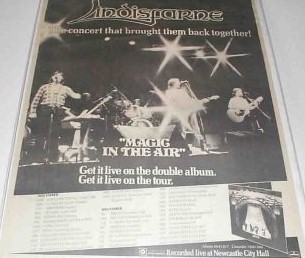 There really is nothing pretentious about this band, they appeal to the basic human need for togetherness and if you want to remain apart and objective at a Lindisfarne show the atmosphere can be intensify disconcerting. The 1976 reunion gigs sold out and they ended up doing three shows rather than one. The year after they did five and decided to make it an annual event.
There really is nothing pretentious about this band, they appeal to the basic human need for togetherness and if you want to remain apart and objective at a Lindisfarne show the atmosphere can be intensify disconcerting. The 1976 reunion gigs sold out and they ended up doing three shows rather than one. The year after they did five and decided to make it an annual event.
“We had regarded the ‘77 show as a finale because we didn’t want to become a band who just trotted out old material all the time but we all found that we had improved. We had all been doing other things and found that we fitted back together better than ever. We started getting offers from record companies and we mulled it over for a while. After the ‘77 show we listened back to the tapes. It sounded so good we thought we would give it a go.”
Rather than publicly announce it they went off to the studio and recorded four songs which were the seeds of the album Back and Fourth produced by Gus Dungeon. The single Run For Home was a massive hit and summed up exactly why they were back and brimming with energy.
“It was much better. We were doing it on our own terms and not many people get a second bite at the cherry.”
The band had survived the chimeras of stardom and come through to find a sustainable reality. Newcastle brought them back to the bed rock of their experience.
In those ten years since they have gone on to make several more albums culminating in their latest, Amigos. They have brought some new blood with Marty Craggs, a mere 39 years of age, adding extra writing stimulus and saxophone appeal to the sound and the shows. He is a Tynesider born and bred and has fought the same battle to play his honest way through life. He has helped the band to find a new path along the old lines of simplicity and working optimism.
Lindisfarne have been turned full circle and have come back to their roots, but they have collected a great deal of experience along the way and Ray believes this is apparent on their latest album. He looks back on the early years with affection:
“We used to be so poor, we used to have mend the tour bus radiator with Opal Fruits. In the early days Si used to have to make a plea for somebody in the hall to put us up for the night.”
Physically too, the band have come full circle. At the gig that night Alan announced to the audience that he had just become a grandfather. With increasing media attention, Tyne Tees Television have made four half hour shows on the band and Central TV have recently recorded a concert. The band are back on form.
“The way we play is an embodiment of all the things we have been interested in over the years. I think we have made our little mark. We have created some good music on our terms and we are not going to be manipulated by anyone.”
